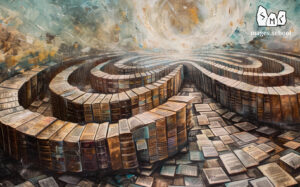The algorithm for reading magical literature
All literature, as you know, is written by people.
There was a person, a product of his time, and he belonged to a certain tradition, a certain religion. He had a personal history. And all that was a filter through which information was refracted. As it was refracted through his mental body, through his hands, through his eyes and through his thoughts, the information took the form of a complete work.
So in order to extract the essence of the information and understand why it affected you the way it did, you need to separate one component of the information from the other.
It is necessary to determine which had the greater influence: the effect of the person’s personality or the informational component in the form of the essence conveyed in the book. To do this, we simply need to ask the question – in what tradition was the book written? That is, we should immediately understand that, for example, Agrippa wrote in one tradition, Gabalis in another, and look at the history of the authors. In other words, how did his thinking develop? Usually the biography of an author is written from the beginning. If you realise that one does not exist without the other, what you will see in the book will be a kind of imprint, a reflection of that tradition. If you need the imprint, you’ll take it, and if you don’t, you should ignore it as an unimportant fact.
We need to ask the question: What is the purpose of this book?
Isn’t there something the author wanted to say? This is very clear in the introduction to the book. It has always been customary to write to whom the book is dedicated, and we cannot ignore this valuable information. We would be very ignorant and foolish to ignore it. It tells us exactly what tradition the author belongs to.
Umberto Eco said it brilliantly: ‘When we consider a book, we mustn’t ask ourselves what it says but what it means’. And if you think about this sentence, you will come closer to a true understanding of literature, because all literature is emasculated by tradition.
In the end, all that remains is the tradition and the author’s thoughts. And then you apply them, one by one, to yourself and observe your own effect. Here is the tradition, what does it do to the magical component of consciousness: does it kill it, does it make it stronger, or does it have no effect at all?
Take the author’s idea, extracted from any tradition, and do the same with it. Something is bound to produce the positive effect you need. If you look for such a key element, you will eventually find it, and then you will find it unmistakably in every literature of every era and tradition.
And if we apply the tradition itself to ourselves and realise that this tradition helps, then all the literature of this tradition will have the same effect. It becomes clear that we should go deeper and not throw our consciousness in different directions.
Additional Information:
Literary Sources:
